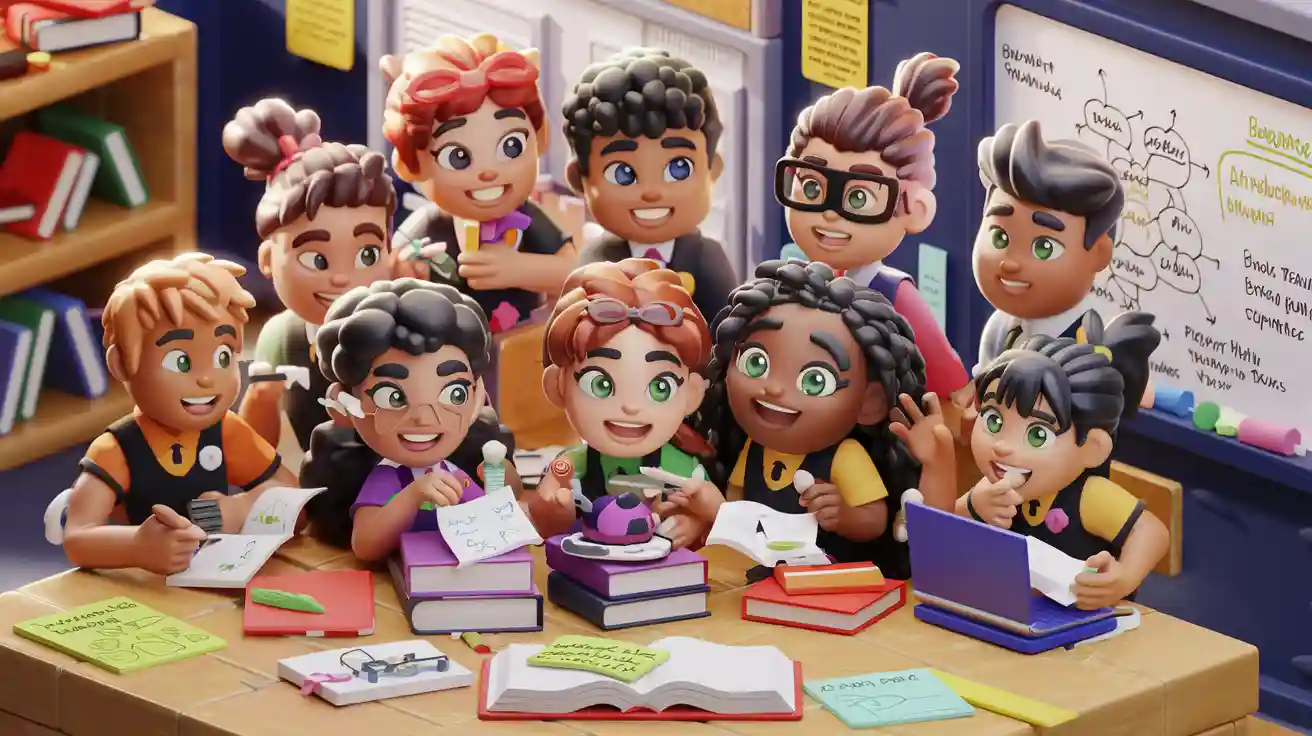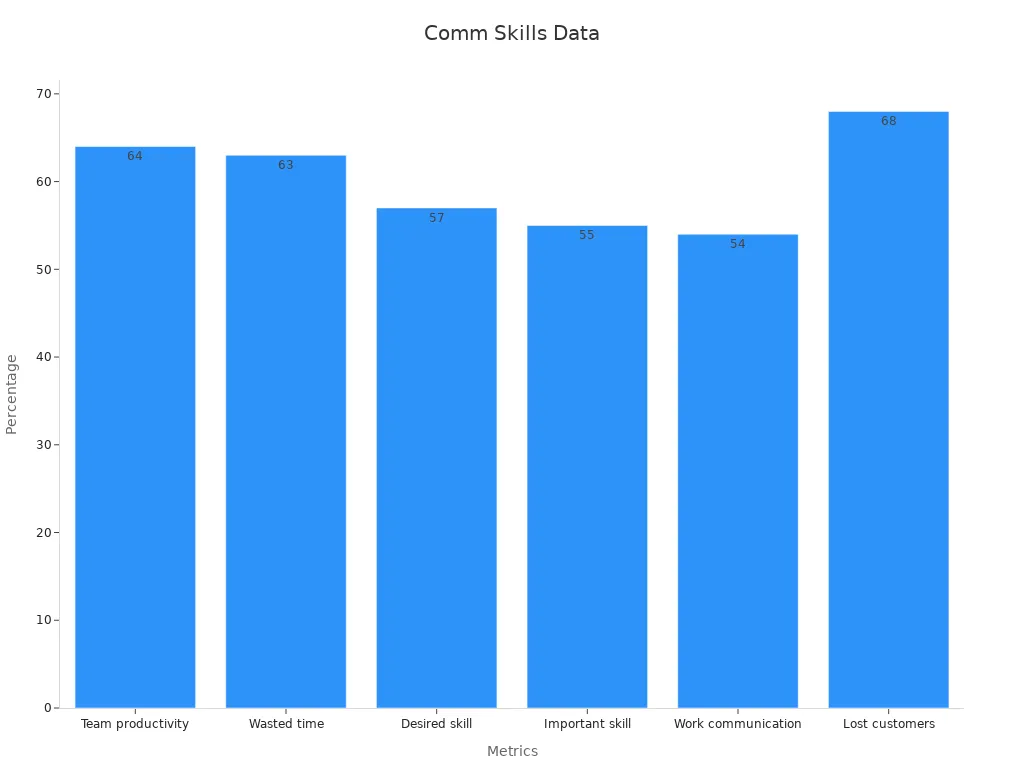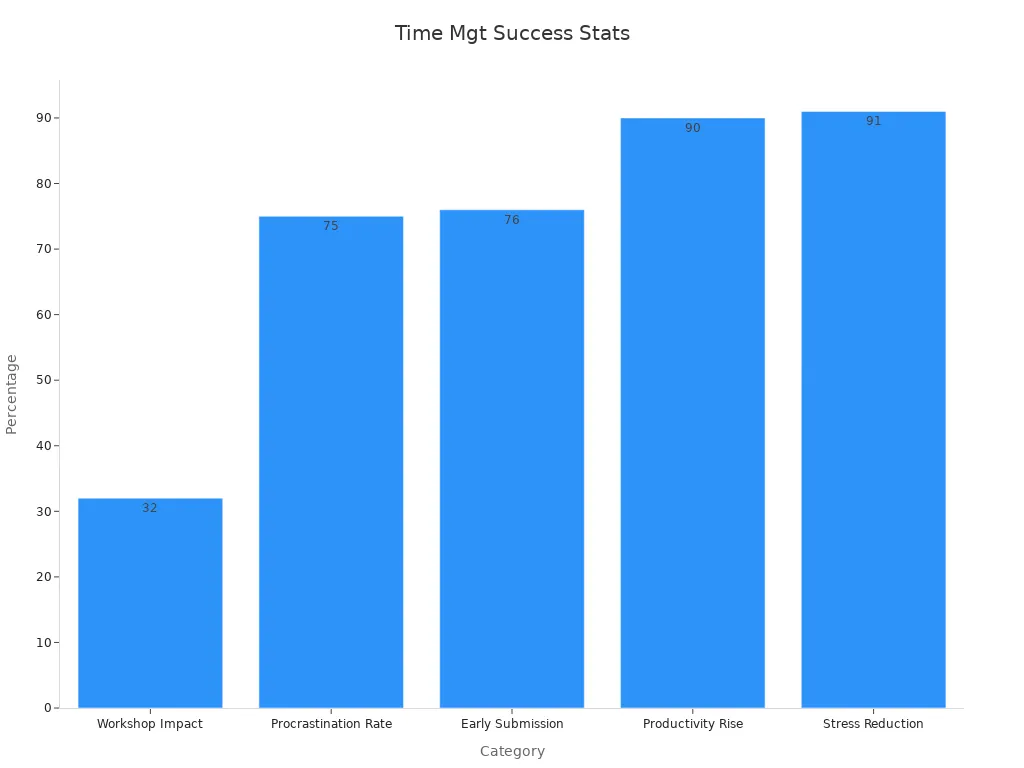5 Essential Soft Skills Every Student Should Develop for Success

Success in jobs needs more than good grades. Employers look for important students soft skills to succeed in tough job markets. Skills like flexibility and resilience help handle problems and seize opportunities. Effective communication, emotional understanding, and collaboration are key life skills. These skills build strong relationships and enhance your employability. For instance, workshops by the University of Michigan's Leadership Initiative teach teamwork and emotional intelligence. This helps students prepare for diverse workplaces. Learning these students soft skills early on aids in achieving success and growth in your career.
Key Takeaways
Good communication is key to doing well. It creates trust and helps teamwork. Practise by joining clubs or leading tasks.
Managing time lowers stress and helps you do more. Try tools like the Eisenhower Matrix to organise tasks and set small goals.
Working in teams is important for future jobs. Work with classmates on projects to get better at teamwork.
Communication: The Key to Success
Why Communication Matters
Good communication helps share ideas clearly and easily. Employers often say it is one of the top skills they want. Clear communication makes work smoother, builds trust, and keeps teams happy. Leaders who focus on good communication reach goals faster. They also encourage their teams to think creatively.
Did you know poor communication wastes time? Studies show 63% of wasted time at work happens because of bad communication. But good communication can make teams 64% more productive.
Everyday Uses of Communication Skills
Communication is important in school and work. For example, presenting a class project needs speaking and writing skills to explain ideas well. At work, talking face-to-face builds trust, which is important for leaders. Companies like Mettler Toledo have saved time and improved teamwork by using better communication methods.
Benefit | What It Means |
|---|---|
Share key information | Talking face-to-face makes sure important details are shared clearly. |
Understand feelings | Body language helps people understand each other better. |
Build trust | Talking in person creates trust, which is needed for good leadership. |
Ways to Get Better at Communicating
To improve communication, practise and get involved. Join groups where you can talk and share ideas with others. Group discussions or debate clubs can help you speak better. Online learning groups also let you share and get feedback.
Tip: Lead group projects to practise sharing your ideas and guiding others.
By improving communication, you can make better connections, feel more confident, and get ready for success. Communication is a must-have skill for students in today’s world.

Time Management: Mastering Your Minutes
Why Time Management Matters for Students
Time management helps you stay on track and meet goals. It lets you plan your time wisely to finish tasks on time. Without it, you might feel stressed and less productive. Research shows students with good time management do better in school. They also feel less worried about their work.
Statistic | What It Means |
|---|---|
32% of college students think time management workshops would help them. | Shows many students want to improve their time management skills. |
75% of college students often delay their work. | Proves procrastination is common and harms school performance. |
76% of students who finish early get better grades. | Suggests managing time well leads to higher academic success. |
90% of people say time management boosts productivity. | Links good time use to better results in school and work. |
91% believe it lowers stress. | Shows managing time can help you focus and perform better. |
How Good Time Management Works
Using time wisely can change your daily habits. For example, students who plan tasks with tools like the Eisenhower Matrix finish work early. This helps them do better in school and feel less stressed. At work, people using tools like Trello or Asana work faster and with others better. Methods like the Pomodoro technique, where you work in short bursts, keep you focused and energised.

Easy Tips to Improve Time Management
Getting better at time management takes practice and smart methods. Try these tips to start improving:
Focus on important tasks: Use tools like the Eisenhower Matrix to decide what matters most.
Set small goals: Break big tasks into smaller, easier steps.
Avoid distractions: Work in a quiet place and block distracting websites.
Track your time: Apps like Toggl can show where you waste time and help you fix it.
Take short breaks: Use the Pomodoro method to work hard for a bit, then rest.
By following these tips, you can handle stress better and balance school with personal life.
Teamwork Skills: Succeeding Together
Why Teamwork Matters for the Future
Teamwork is key to doing well in life. Employers say working well with others is one of the top skills they need. Good teamwork helps you do better in school and prepares you for jobs. Studies show learning teamwork early improves grades and teamwork abilities. Colleges suggest starting teamwork training early to get ready for future careers.
Evidence Description | Importance |
|---|---|
Teamwork is seen as a must-have skill for success. | Shows how teamwork helps in school and future jobs. |
Teamwork skills predict how well students perform in school. | Proves teamwork skills are linked to better grades. |
Training in teamwork leads to better school results. | Suggests learning teamwork can improve skills and success. |
Teamwork in School and Work
Teamwork is needed in both school and work. For example, students working together on projects often finish faster and do better. One group finished a project in half the time by working as a team. At work, teams that talk openly and respect each other feel 80% happier and work harder. Another example is a leader who planned a fun activity to cheer up the team during a tough deadline.
Example Type | Description |
|---|---|
Communication example | Team members talked clearly to fix a problem quickly. |
Efficiency example | A group finished a task faster by sharing the work. |
Engagement example | A leader planned a fun event to lift team spirits. |
High performing example | Praising a teammate made everyone feel more motivated. |
Individual strengths teamwork | A new member got tips from a teammate, helping him work better. |
How to Get Better at Teamwork
Getting good at teamwork takes practice and planning. Try these steps to improve:
Know the team’s goal. Make sure everyone understands why the team exists.
Set clear targets. Agree on goals that everyone can work towards.
Talk openly. Create a space where everyone feels safe to share ideas.
Work together. Make sure everyone’s opinions are heard and respected.
Be creative. Welcome new ideas and think outside the box.
Trust teammates. Let everyone take charge of their tasks.
Solve problems as a group. Learn ways to fix issues together.
By practising these steps, you can become a better team player. Strong teamwork helps you succeed in school and prepares you for your career.
Emotional Intelligence: The Heart of Leadership
What Emotional Intelligence Is and Why It Matters
Emotional intelligence means understanding your feelings and others' emotions too. It helps you manage emotions and react kindly to others. This skill is important for being a good leader and growing as a person. Leaders with strong emotional intelligence inspire teams and create happy workplaces. Research shows 90% of top workers have this skill, but only 20% of poor workers do. Leaders with emotional intelligence are 70% more likely to do better than others.
This skill has many benefits. It helps you stay calm, make smart choices, and build good relationships. For example, a CEO once showed kindness to a struggling worker. This made the team happier and work better. This shows how emotional intelligence can turn problems into chances to grow.
How Emotional Intelligence Helps in Life and Work
Having emotional intelligence makes it easier to connect with people. It helps you talk clearly, solve problems, and earn trust. Workers with this skill handle stress well and adjust to changes quickly. Studies say emotional intelligence predicts job success better than IQ or technical skills. It also helps you work well in teams where understanding others is key.
At work, emotional intelligence encourages creativity and flexibility. Leaders with this skill guide teams through tough times successfully. For example, during big changes in a global company, leaders with emotional intelligence made workers 25% happier and improved client trust.
Steps to Build Emotional Intelligence
You can improve emotional intelligence by focusing on four areas:
Self-awareness: Notice your feelings and how they affect your actions.
Self-management: Control quick reactions and adapt to new situations.
Social awareness: Watch others’ words and actions to understand their feelings.
Relationship management: Build strong bonds by talking clearly and fixing problems kindly.
Mindfulness is another way to grow emotional intelligence. By staying focused, you can notice small emotional signs others miss. This helps you react wisely and connect better with people.
Improving emotional intelligence makes you more confident and ready to lead. It is one of the best skills to learn for lasting success.
Critical Thinking: Solving Problems with Confidence
Why Critical Thinking is Important
Critical thinking helps you make smart choices and solve problems well. It lets you check facts, understand ideas, and spot strong or weak points in arguments. This skill is useful for school tasks like essays and group projects. Thinking deeply and combining ideas are key for doing well in school and work.
Research shows people with high critical thinking scores solve problems better. Being curious and open-minded helps you learn and handle tough tasks. By improving critical thinking, you can face challenges with creativity and confidence.
How Critical Thinking Helps in Life
Critical thinking is useful in many parts of life. It helps you study situations, make good choices, and adjust to changes. Here are some examples:
Benefit | What It Does |
|---|---|
Careful Study | Helps you look closely at situations to find the best way. |
Real-life Use | Shows how plans work in real jobs or businesses. |
Learning Value | Teaches you to think about hard problems and decide wisely. |
Flexibility | Helps you understand different situations and learn from them. |
Persuasion | Makes your ideas stronger by showing clear examples and results. |
Whether solving a maths question or picking a career, critical thinking helps you succeed.
Ways to Improve Critical Thinking
You can get better at critical thinking by using simple methods. Join workshops that teach you to ask questions and think clearly. These sessions help you notice mistakes and use facts to support your ideas.
Another way is to practise critical thinking drills (CTDs). Read articles, ask questions, and think about the answers. Learning through projects or asking questions also helps you stay active and think deeply.
Hands-on learning is another great way to improve. These activities are planned to teach you how to solve real-world problems. They focus on clear goals and careful thinking.
By practising these steps, you can sharpen your critical thinking. This will help you handle schoolwork and prepare for future challenges.
Learning soft skills can improve your life and career. These skills help you talk clearly, lead well, and handle problems. Employers want workers who can adapt and work with others. They often care more about your potential than your past experience. Building these skills makes you ready for success and helps you shine in any job.
Suited Tutor gives expert help to grow these important skills. Their personalised methods help you feel confident and learn tools to succeed. Begin your journey to success today with Suited Tutor.
FAQ
What are soft skills, and why do they matter?
Soft skills are traits like communication, teamwork, and being flexible. They help you work well with others and succeed in school or jobs.
How can I improve my soft skills?
Join clubs, work on group tasks, or try online classes. Practise often and ask for advice to get better step by step.
Tip: Work on one skill at a time to stay focused.
Do soft skills really affect career success?
Absolutely! Employers value soft skills as much as knowledge. Good soft skills make you flexible, a team player, and better at solving problems, which helps your career grow.
See Also
Four Key Strategies To Achieve Academic Excellence Effectively
Ways To Foster Student Resilience And Conquer Challenges
Five Practical Tutoring Methods With Real-Life Applications
Ways Tutors Can Assist Students In Building Resilience
Proven Stress Relief Strategies For Children Facing Academic Challenges

